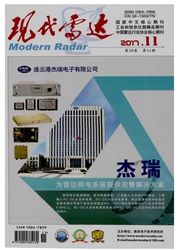

 中文摘要:
中文摘要:
针对地表目标散射具有随机取向特性,给出一种新的基于散射模型的极化合成孔径雷达相干斑抑制算法。首先将去取向理论用于相干斑抑制的预处理过程,之后在考虑图像中存在混合散射像素的情况下,通过Freeman分解将像素分成4种散射类型,利用欧式距离分类器对像素进行无监督分类,最后按最小均方误差准则对图像降斑处理。利用美国宇航局喷气推进实验室(NASA/JPL)的AIRSAR系统实测数据进行实验,结果表明,文中方法由于考虑了图像中目标散射的随机取向特性和混合散射情况,并采用相应的处理方法,改善了像素初始分类结果,相干斑抑制效果和分类结果明显优于LEE的基于散射模型降斑算法。
 英文摘要:
英文摘要:
Scattering targets of complex terrain surfaces are often randomly oriented and cause random fluctuating echoes. Aimed at the characteristic, a new PolSAR despeckling method based on scattering model is proposed in this paper. First, the deorientation process is applied to PolSAR data. Then, freeman decomposition is used to divide image pixels into four dominant scattering cate- gories under the situation of considering existence of the mixed scattering mechanism. Unsupervised classification is performed to the pixels using euclidean distance measure. Finally, speckle suppression is done based on the minimum mean square error. On the basis of deorientation concept and mixed scattering mechanism, the new algorithm improves the initial classification result of pixels. Experimental results with PolSAR data from NASA/JPL AIRSAR system demonstrate that the proposed method achieves better performance both on speckle suppression and terrain classification compared with Lee's method.
 同期刊论文项目
同期刊论文项目
 同项目期刊论文
同项目期刊论文
 期刊信息
期刊信息
